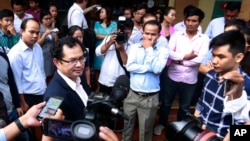The Phnom Penh Post, Cambodia’s last remaining independent daily newspaper, fired its editor-in-chief amid a staff walkout after it published an article linking the new owner of the paper to Prime Minister Hun Sen.
The Post, which was previously owned by Australian mining businessman Bill Clough, was sold to Malaysian public relations executive Sivakumar S.Ganapathy this week.
Ganapathy owns Asia PR, which has represented numerous politically connected clients over the years, including the controversial former chief minister of the Malaysian state of Sarawak, Abdul Taib Mahmud.
Asia PR also claims to have helped Hun Sen become prime minister.
The Post had come under pressure in recent months following the closure of its rival English-language daily, The Cambodia Daily, which was hit with a hefty tax bill. The Post was also handed a tax bill to the tune of $3.9 million, which was settled ahead of the sale, according to a statement from Clough.
Kay Kimsong, the editor-in-chief, was fired on Monday after representatives of the new owner ordered senior staff to remove the article on the sale from its website, claiming factual inaccuracies.
Five senior staff members later resigned in protest, as well as the CEO, Marcus Holmes. A lawyer for Ganapathy said the new editor-in-chief, identified as Joshua Purushotman, would vet articles in future editions.
The Post, which was founded in 1992, reported the lawyer as saying that the article on the sale was ordered removed because it “damaged our reputation” and declined to discuss the alleged inaccuracies in detail.
“According to the new owner, he thinks that I have made a huge mistake,” said Kimsong. “They think the article should not be published.”
“My trade is journalism and I don’t know what else to do. There are two options -- one is that if I can’t go back to newspapers, I will just sell fried noodles,” he added.
Ananth Baliga, one of the two journalists who wrote the article and who was also subsequently ordered to be fired along with Kimsong, said he had resigned after being ordered to take down the article.
“I will not be returning to work at the Post. I am devastated at the prospect of not being able to work every day with the some of the best journalists I know. I wish them well,” he wrote on Twitter.
“From the outside looking in, the most troubling thing is the timing of the tax bill's settlement and the Post's subsequent sale. The odds of them not being connected seem incredibly remote," the paper's former editor-in-chief, Chad Williams, told Reuters on Sunday.
"That's troubling because it suggests the Cambodian government may have used the threat of a shutdown to essentially coerce the sale," Williams added.
Sok Eysan, a spokesman for the Cambodian People’s Party (CPP), rejected the allegations of government influence in the sale
“It's selling and buying. They made a bilateral contact. The government didn’t interfere with this,” he said.
Chhay Channyda, chief of staff at the Post, was concerned by the possible loss of independence under the new management.
“This is what we worry about because on the first day when there is a new boss or new company they came to ask us to remove an article that we wrote,” she said.
“It’s putting pressure on our work to have no independence,” she added.
Staffers at the Post on Monday protested Kimsong’s firing, saying the move was unfair and contradicted the pledge to support a free press.
“We just felt like the removal of the staff members were unfair and contrary to our commitment to independent journalism,“ Andrew Nachemson, a Post reporter who resigned on Monday, told VOA Khmer in a phone interview.
Another reporter at the paper, who asked to remain anonymous, said: “I think that our editorial independence will be compromised. I just don’t think we’ll be able to achieve the same amount of integrity and independence that we had under the old management.”
Yon Sineat, a reporter, said she saw the takeover as a “serious threat to press freedom.”
“We are concerned that we will not be able to fully practice our journalism or write to reflect the truth.”
In a statement on Monday, Reporters Without Borders said the takeover of the Post was part of a crackdown on media freedoms in Cambodia.
“After the closure of Radio Free Asia and Cambodia Daily, the Phnom Penh Post was one of Cambodia’s last independent media voices. In the run-up to general elections, Prime Minister Hun Sen is pursuing his shocking crackdown on media outlets that don’t toe the government line,” it said.
Additional reporting by Say Mony in Washington.










